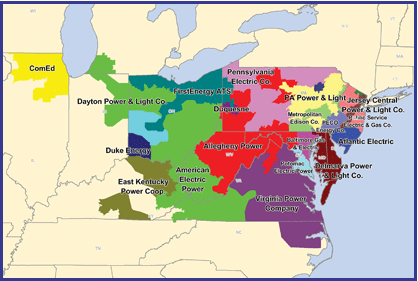States Must Fight the Latest Fossil Fuel Bailout
Residents across 13 states may face billions of dollars in higher energy costs as punishment for their states’ clean energy policies.
Do you live in a Mid-Atlantic or Appalachian state? If so, chances are that a critical upcoming vote at the Federal Energy Regulatory Commission (FERC) will affect you, your energy bills, and your access to clean energy.
FERC will soon decide whether to put in place sweeping changes that will impact electricity rates in these states. One key proposal put forward by the regional grid operator, PJM, would add billions of dollars to consumers’ energy bills to fund the buildout of unneeded dirty power plants. For states that have adopted clean energy policies, this amounts to a huge penalty that undermines their initiatives. On top of those punitive price spikes, PJM would literally give millions of dollars away to power plant owners — handouts for which consumers would pay through higher regional energy bills. This outrageous proposal is not what customers want and not what federal regulators asked for. It is both illegal and dangerous.
Federal Energy Regulatory Commission
PJM Electric Regions. PJM centrally dispatches generation and coordinates the movement of wholesale electricity in all or part of 13 states: Delaware, Illinois, Indiana, Kentucky, Maryland, Michigan, New Jersey, North Carolina, Ohio, Pennsylvania, Tennessee, Virginia, and West Virginia.
Climate policies under threat
For decades, fossil fuel power plants have benefited from policies that give them a leg up over the competition. Massive tax breaks, not paying to clean up the pollution they leave behind in communities, and subsidized fuel are only some of the advantages dirty plants enjoy. Recently states have begun to level the playing field by launching their own programs to support clean energy. Cheaper, cleaner, and job-creating, renewable energy is taking off as states remove barriers.
Enter PJM, the grid operator that runs the regional energy markets, and FERC, whose job is to make sure that the markets run by PJM are fair and the grid is reliable. Fossil-fuel power plant owners began to complain that they were not making enough money, because when we have a level playing field, clean energy is cheaper. FERC issued a ruling — which Earthjustice is fighting — directing PJM to come up with a solution to this “problem.” Even as FERC wrongly called for changes to market rules, it also directed PJM to ensure states policies are “accommodated” — in other words, that states are free to pursue clean energy policies so long as any effects on competition inside the PJM market are addressed.
Paying more for dirty power we don’t need
But in October, PJM laid out a plan that would blatantly penalize states and their residents for their clean energy policies. Yes, PJM would allow state-supported generation to sell its services outside of the PJM market. But PJM would not subtract out that generation from its calculation of what the grid needs, acting as if the clean generation being built to meet state policy goals simply doesn’t exist. Pretending there is a scarcity when none exists forces prices to skyrocket — according to a report by the independent market monitor, by more than $8 billion/year across the region.
Perversely, the higher prices caused by PJM’s plan will cause investors — who use market prices as a signal for when it’s a good bet to build — to fund more, wholly unnecessary fossil-fuel projects. In short, under PJM’s plan, residents who voted in clean energy policies will be stuck with higher energy bills and more — not less — pollution-belching power plants.
To add insult to injury, PJM’s plan includes a million-dollar giveaway for power plants that lose out because they can’t compete. PJM wants to give owners of these plants a consolation prize just for putting in a bid. Outrageously, power plant developers could be paid millions for projects that need never be built.
FERC still has an opportunity to reject PJM’s harmful plan. Earthjustice is working with a coalition of environmental groups and consumer advocate allies to oppose the plan, and we urge state and local officials to join us. Too much is at stake — from the billions of dollars in excessive costs on customers’ bills, to the prerogative of states to protect their citizens from pollution, to the leadership of states that remain the tip of the spear in the fight against climate change.
Earthjustice’s Clean Energy Program uses the power of the law and the strength of partnership to accelerate the transition to 100% clean energy.
